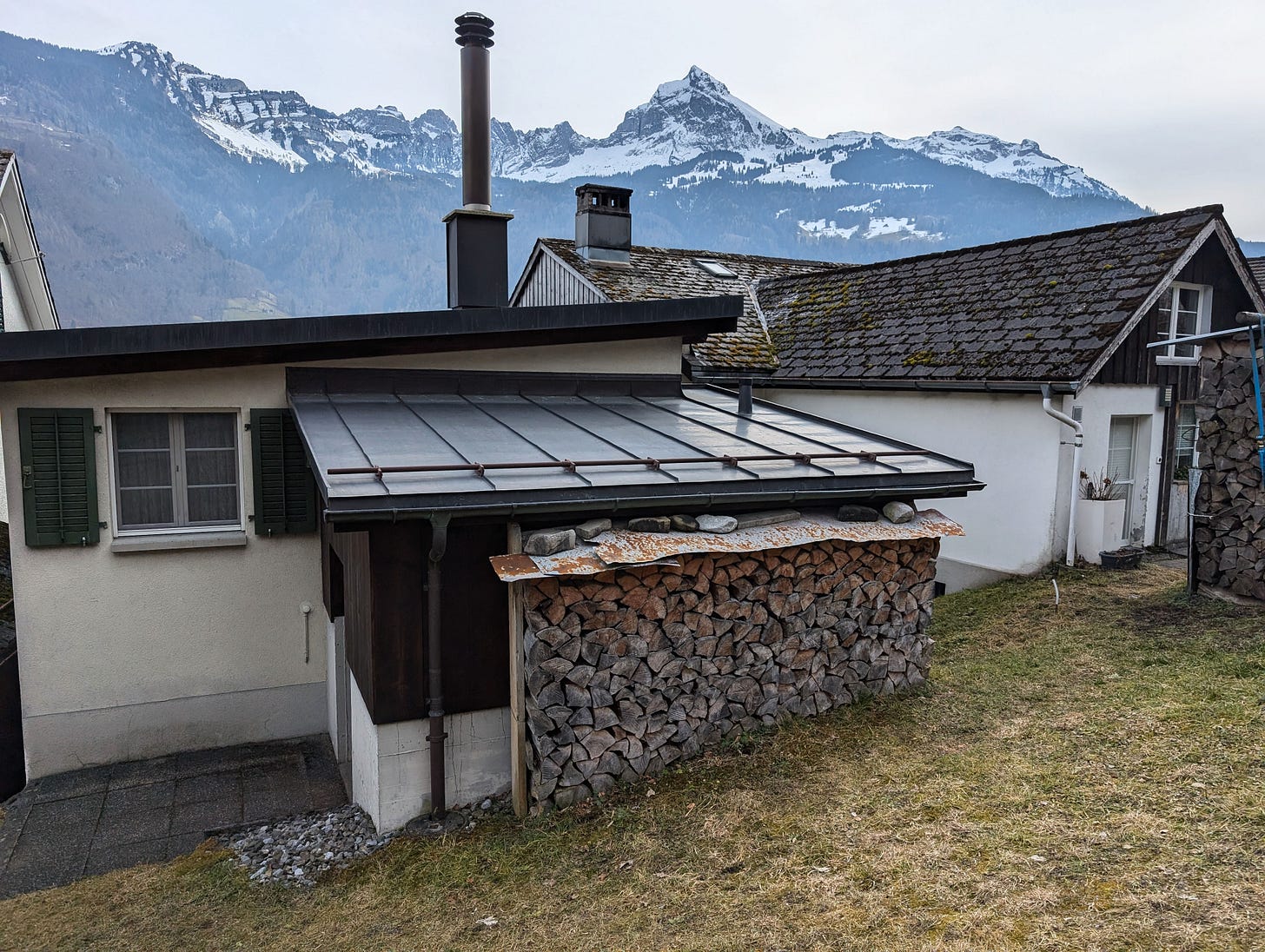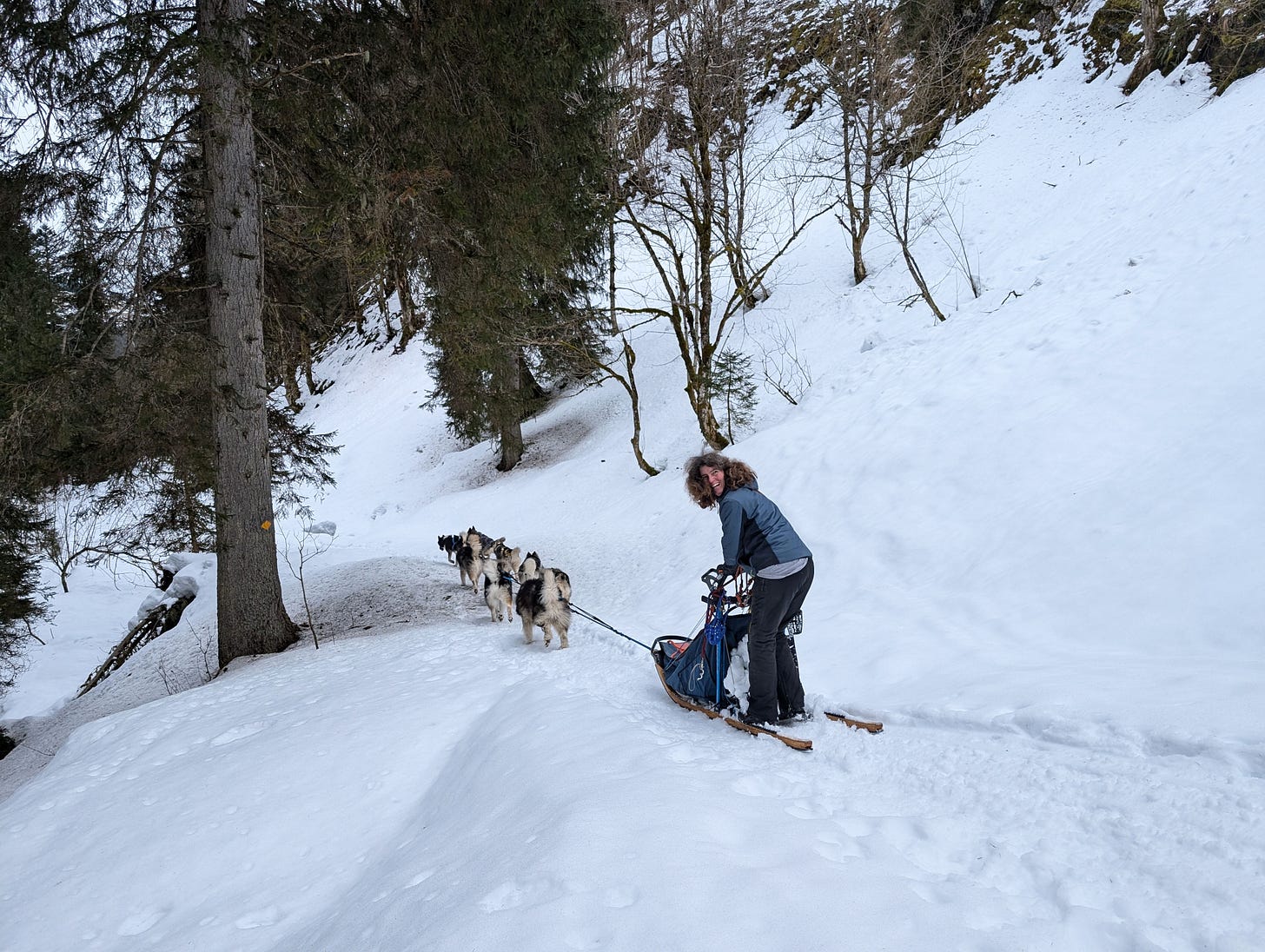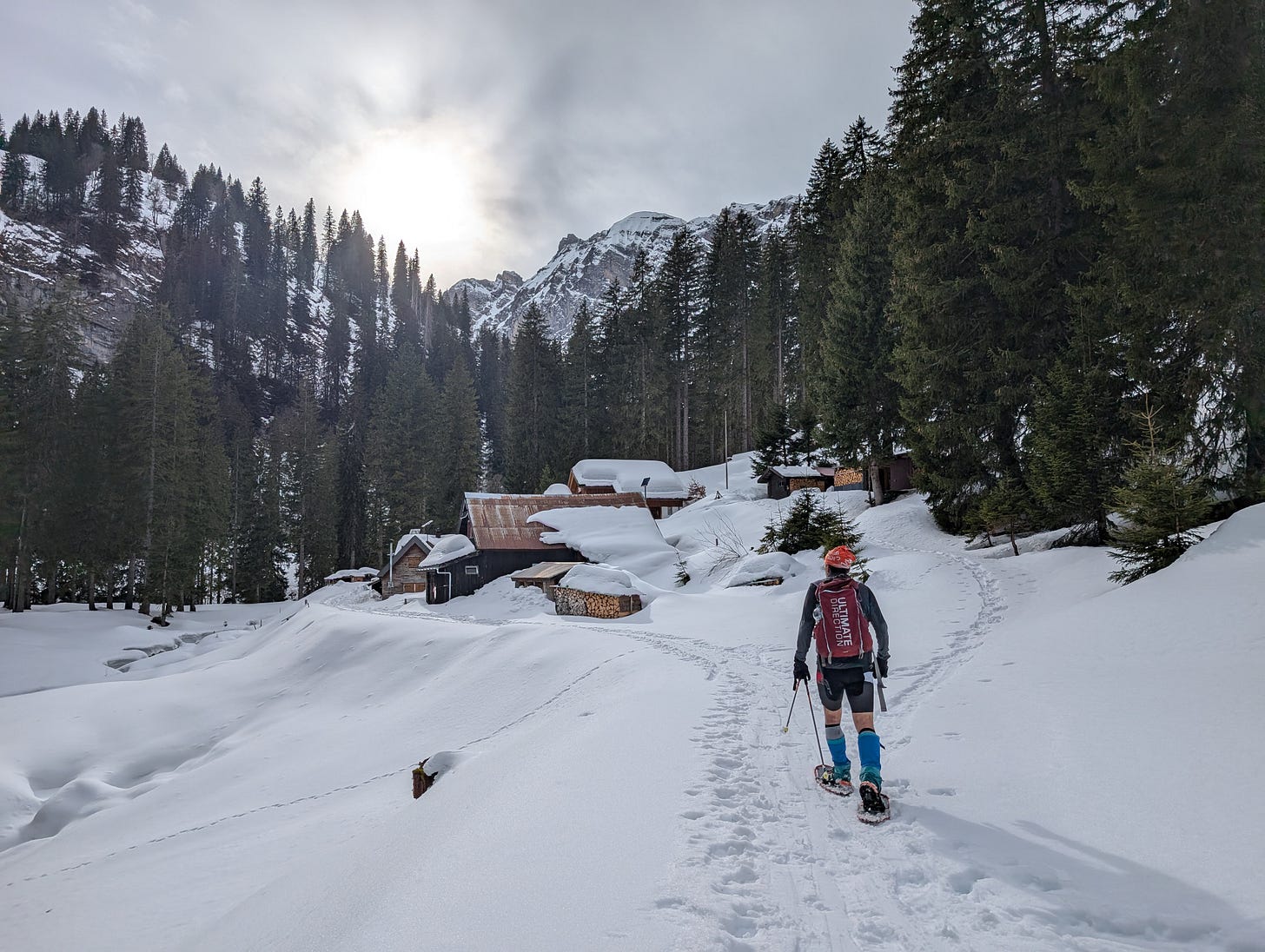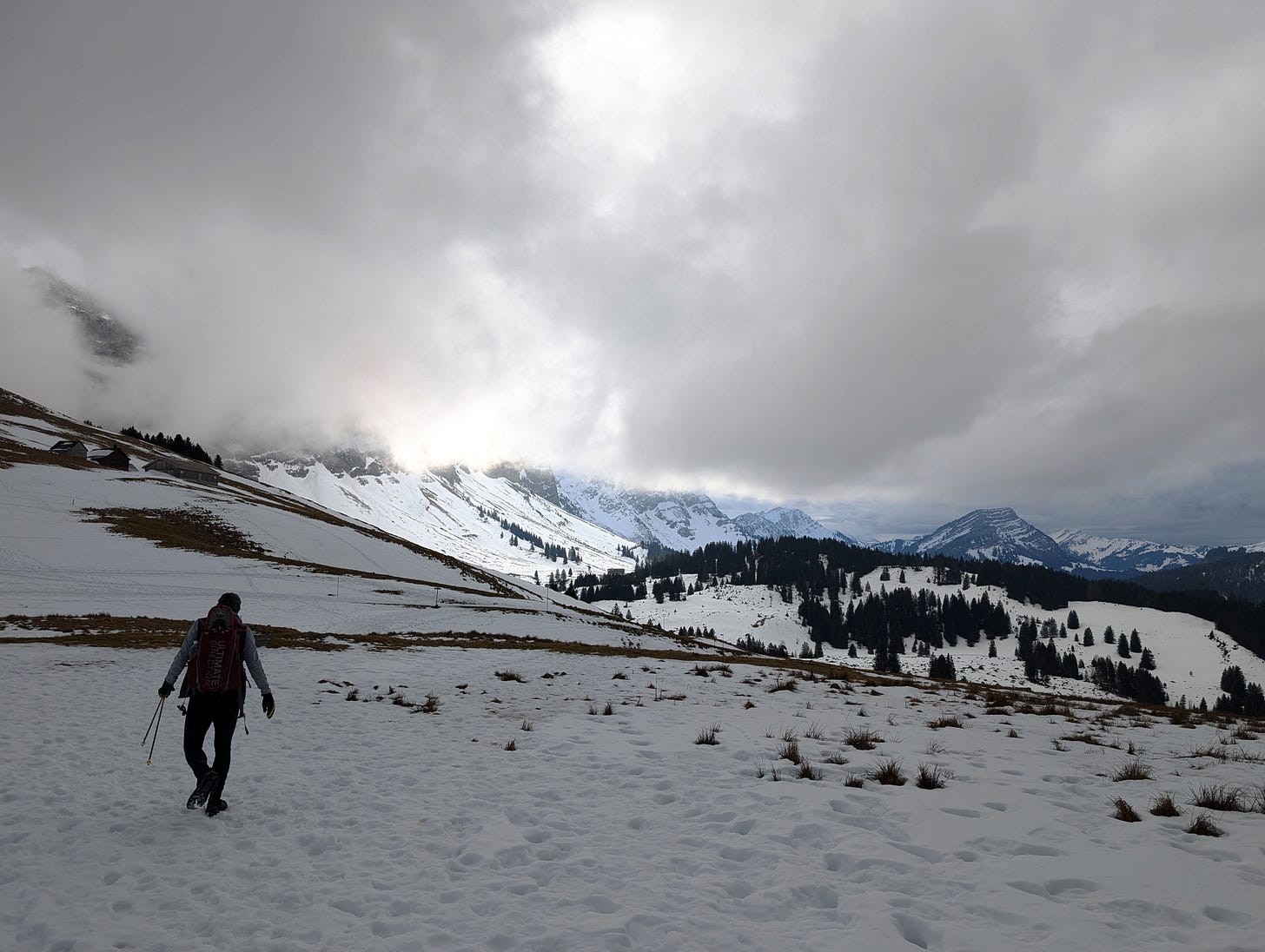Beat and I decided to travel to Switzerland for two weeks. He wanted to visit his mother, who is 90, and I can attest that spending time with beloved parents while you can is worth any cost. We’ve also never been to Switzerland in the winter — Beat hasn’t since he was a child — and we wanted to understand what it’s like. We reasoned that a few explorations through the snowbound landscape would give us a sense of how we’d spend our time if we retired here. That longtime dream of mine is becoming more realistic every day.
Beat’s mom does not want us to retire in Switzerland. She thinks she’ll be long gone by then, and then we’ll be alone in a devastatingly expensive country that does not have universal healthcare, and no one will like me or talk to me because I’m an American. And sure, these things are true. But I already live in an expensive country without universal healthcare, and I already don’t like myself because I’m an American. But if I had a little spot in an Alpine valley, a cute chalet where I could grow a vegetable garden and little red flowers in window boxes as decreed by law, where all I had to do to be with mountains that I love is walk out the door, and share little kindnesses with my neighbors but otherwise be left alone — I’d be in heaven.
I’ve been in a strange headspace since November 5. Strange, because it’s been mostly good. It’s as though I spent years draping curtains over my fears for the future, only to have my weak defenses suddenly torn down and tossed in a heap. As I rushed to gather them up again, I glanced outside the window at my storm of terrors and noticed a stream of light cutting through the haze. And I realized that light had been there all along. The haze started creeping through the now-open window. Let it come. The haze could envelop me but the light would stay with me because the light was within me.
“Have I had a breakthrough?” I wonder. “Have I finally embraced my fears?” I’m not sure. I still believe in it all — the coming storms of climate change, the rise of authoritarianism, more chaos and violence, less freedom and comfort. I still hope I’m wrong, but if not, maybe I’m … ready? I remember being an anxious and hyper-aware 7-year-old, curling in a ball under my desk when the elementary school held a nuclear bomb drill. The Challenger Space Shuttle exploded while we watched it live on the television in class. My second-grade teacher whispered ominously, “Soviets.” Many of my sharpest childhood memories carry elements of doomsday. Between religious teachings and political awareness, I’ve more or less believed in the End of the World for my entire life. I’ve spent my adult life fearing that Collapse would happen in my lifetime, that I’d have to experience the searing pain of everything I know and love suffering and dying. But over time, I’ve reached the understanding that everything I know and love will die, whether it happens slowly or all at once. That everything in life is suffering and pain, but it’s also beauty and joy and music and love. I still feel grief, but perhaps I’m nearing something that feels more like … acceptance.
The Work is far from done. But I believe our most impactful contributions will come from how we treat others, how we lift the people we love, how we protect the people we can, how we appreciate and remember our little pieces of the world, and of course, the stories we tell. I’ve spent far too much energy and life fearing the future when it simply doesn’t exist. Those storms I was hiding from were always in my imagination. By blocking the haze, I snuffed the light. I’m determined not to do that anymore. I have no idea what the future holds, and that’s all right. I’m going to face it with my eyes open and my heart full. And I’m going to follow my light without guilt or expectation. Even if I do feel guilty about my bougie dream to retire in Switzerland and spend winters in Alaska (if the borders stay open. As I said, I no longer believe in a specific future, but one can dream of the best sort of future.)
This low-expectation trip has been great so far. We left on Friday when I was seven days out from my first COVID test but still testing oh-so-faintly positive. I wore a mask and tried to orient myself to being in the world again. A week isn’t a long time to hole up at home, but in some ways, it feels like an eternity. I made an exceptionally dumb move — which I blamed on “COVID brain” — when I left a bag with my wallet, phone, and passport on a bus. The bus travels in a loop between long-term parking and the Denver Airport terminal — an exceptionally long trip. As soon as I realized what I’d done, I was upset but also surprisingly calm. Beat was too — a credit to him, as my worst panic spirals happen when others are upset. We asked an airport worker for advice and were told it would be best to return to the bus stop and wait for the driver to return. Beat had the brilliant idea to call my phone, and a lady who was a passenger on the bus picked up. She handed my bag to the driver. Then we waited and waited. Beat acknowledged he needed to leave to go through security — we both agreed that it was silly for us both to miss the flight when I was the one without a passport. After he left, I waited and waited. No wallet, no house keys, no phone. I’d begged a bit of cash off of Beat should I need to return to the car and pay for parking. The whole time I was thinking — so what if I lose my passport and miss this trip and have to break into my own home? That’s not the end of the world. I was shockingly blase about my predicament.
The bus arrived in a train of four buses after a gap of nearly 45 busless minutes — ah, the efficiency of DIA. My driver was the last in line. There wasn’t room for him to pull up to the curb and he refused to open his door for me — protocol, I imagine. But I stood in the road and made begging and pleading motions with my hands until he relented. He handed me a bag without a word and I blurted out, “Thank you, sir, thank you so much. I would give you a tip but all I have is Euros right now and I don’t think you want Euros and …” my face flushed and I turned away. Why was I acting like such an idiot? I jumped down from the bus and took off at a full sprint.
Any reservations I had about exerting myself while recovering from COVID melted away as I ran and ran and ran, spewing gobs of respiration into my N95. Luckily the security line was short and I reached the terminal with 10 minutes to spare. Phew!
Our trip is off to a quiet start. The weather has been blah — warm (temperatures in the 40s), gray, and occasionally rainy. We had dinner with our Swiss friends on Sunday, and they told us it’s usually like this in the winter. We spent a few days with Beat’s mom and then headed out for a three-day exploration of parts of eastern Switzerland. This area is not quite as touristy as areas in the South. Some of the cantons here also have a lower tax rate — an obvious priority for retirees.
On Tuesday, we drove to Näfels to hike a recommended snowshoe trail to Obersee. As we hoofed through town, we marveled at all of the perfectly stacked woodpiles next to Swiss houses. “If their wood piles looked like ours at home, they’d probably be fined,” Beat mused. I would not be surprised if that were true. And you know what, I don’t care. If there’s a law mandating perfect wood piles, I will relish the work. I will sit with my ruler, measuring each log, parsing out the puzzle, and curating perfection. That task will beat the hell out of Doomscrolling any day.
The canyon above the Sulzbach River was spectacular. It’s tough to take a great photo on such a flat-light day, but being there was soul-soothing. I think if all I had to do was take care of life tasks and hike in the mountains, I’d be a happy soul. Oh, and stack wood, of course. I’m a rule-follower who loves the slog and is great at mundane tasks. I think I’d thrive in Switzerland.
The Obersee trails seemed to be popular with dog mushers. Swiss huskies! (Siberians, by the looks of the teams we saw.) So fun!
The going was soft and slow. After trekking 7.5 miles, we acknowledged that we’d have to turn around or we’d run out of daylight. But we wanted to keep going, especially when the clouds opened up for the tiniest hint of a sucker hole.
On Wednesday we headed to the Appenzeller region for deliciously sharp cheese and some awe-inspiring crags near Schwägalp Pass. The conditions here were more mixed with ankle-deep slush and bare ground (tussocks, sometimes.) Is it always this warm at 1,500 meters in February? Or is this just the reality of the brave new Alpine climate we’re opting into? (The Swiss Army was off somewhere firing howitzers for … training? … but every loud boom sent my neck straining to find the rockfall. Rockfall from the collapsing permafrost is probably how I’ll die if I move to the Alps, but I can take heart that the Swiss Army is prepared if the Russians come knocking.)
We climbed a ridge that looked like a little nubbin from below but then it added nearly a thousand feet of elevation to our trudge. It also got precariously narrow toward the top with death falls should one roll an ankle off the grass. But the up-close views of the cliffs below Säntis: Worth it!
Wait, why do I think it was worth it? Is this another way my brain has been rewired? Do I no longer freak out in the face of death-defying exposure? Doubtful, but one can dream!
We climbed toward Kronberg as sucker holes opened and closed, misty rain fell, and the tussocky “trail” was so steep that we realized we would have slid right off the mountain if we’d had to wear snowshoes on actual snow. But we had a delicious Swiss ham and pretzel bread sandwich on a bench overlooking the hills of Appenzell, and all was right in the world.
I spent a lot of the descent thinking about Sarah Kendizor, the essayist who got her start as an expert on authoritarian governments. On November 18, 2016, she wrote an essay that I think about frequently and return to regularly, titled “We’re heading into dark times. This is how to be your own light in the Age of Trump.” It’s a wonderful insight into the necessity of embracing your values and never losing sight of them. Sarah’s prescience about current events has continued for the past eight years. Her recent writing has been more introspective and subdued, and also more beautiful than ever. She recently wrote a piece called “The Miners” in which she muses on abandoned mines in Missouri. She talks about collecting minerals from farms and polishing them into beautiful gems. “It might seem an odd way to spend the end of the world, but it makes sense to me,” she writes.
She acknowledges that there’s nothing left she can write to ward off the events she sees coming, just as she didn’t stop what has already happened. It’s not that she doesn’t care, it’s just that she’s worn out. And she’s ready to turn her focus to beauty and joy.
“It’s not that my heart’s not in it,” she concludes. “It’s that my heart is in everything.”















I don't now if you've studied Buddhism or Stoicism, but you've got one of the lessons of both in this post. Basically, don't get caught up in the things that you can't control. The more you get vested in those things, the more likely you will end up unhappy. I'm not sure how or why (maybe meditation?), but I've definitely moved in that direction. It's helpful.
Very good post,touching on many topics that are pressing on us here in Seattle. Thanks 🙏🏻